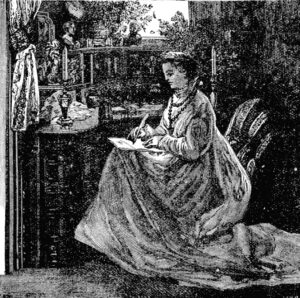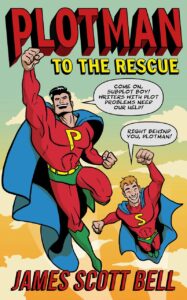by James Scott Bell
@jamesscottbell
 Not every writer is interested in style. If they can write lean, mean plots that move, with interesting characters and a satisfying ending, that’s enough. They’d rather write fast and turn out more work than spend extra time trying to find the “right” words.
Not every writer is interested in style. If they can write lean, mean plots that move, with interesting characters and a satisfying ending, that’s enough. They’d rather write fast and turn out more work than spend extra time trying to find the “right” words.
Isaac Asimov was such a writer. He purposely developed a stripped-down style so he could churn out the books. He was once asked what he would do if he found out he had just six months to live. “Type faster,” he said.
Other writers do seek to enhance their prose. One such was John D. MacDonald, considered one of the great crime writers of the 20th century. He wrote a string of paperback classics in the 1950s, and then invented an enduring series character for the 60s and beyond—Travis McGee.
He was a great plotter, but a careful stylist as well. As he himself once put it: “I want a bit of magic in the prose style, a bit of unobtrusive poetry. I want to have words and phrases really sing.”
While “unobtrusive poetry” is not necessary for a well-plotted novel, it is an elevation. It’s a fine thing to consider stretching your prose. The main proviso is that you never let the style overplay its hand. Serve the story first.
One place where prose style is most fitting is when there is a high emotional moment. Nothing is higher than a young writer dying, in the aptly titled and justifiably famous short story that made William Saroyan’s reputation, “The Daring Young Man on the Flying Trapeze.”
Then swiftly, neatly, with the grace of the young man on the trapeze, he was gone from his body. For an eternal moment he was all things at once: the bird, the fish, the rodent, the reptile, and man. An ocean of print undulated endlessly and darkly before him. The city burned. The herded crowd rioted. The earth circled away, and knowing that he did so, he turned his lost face to the empty sky and became dreamless, unalive, perfect.
Go ahead and stretch your prose in the safety of your own writing room. Three ideas:
- Read poetry
Ray Bradbury, one of our greatest unobtrusive poet-writers, read some poetry every day. “Poetry is good because it flexes muscles you don’t use often enough,” Bradbury says in Zen in the Art of Writing. “Poetry expands the senses and keeps them in prime condition.”
- Write page-long sentences
As an exercise from time to time, write a run-on sentence of 250 words or so. Don’t edit yourself. Let the words take you wherever they roam!
This is a good way to add emotional depth to a scene. When you get to a point where you describe emotion, start a fresh document and write a page-long sentence of inner description. Don’t judge it; just write it.
When you’re done, look it over. Maybe you’ll use most of it in your novel. Maybe only one line. But what you’ll have is fresh and stylistically pleasing. I’m certain this is how Jack Kerouac came up with that famous passage in his novel On the Road:
The only people for me are the mad ones, the ones who are mad to live, mad to talk, mad to be saved, desirous of everything at the same time, the ones who never yawn or say a commonplace thing, but burn, burn, burn like fabulous yellow roman candles exploding like spiders across the stars and in the middle you see the blue centerlight pop and everybody goes “Awww!”
- Play with metaphors
Dow Mossman, author of The Stones of Summer (the subject of a documentary, The Stone Reader) says he considered each page of his massive novel to be its own poem. Naturally it is filled with metaphors and similes.
He stood, leaning against the wooden jamb of the double glass doorway, looking back, and his eyes seemed almost dull, flatter than last year, muted somehow like reptiles not swimming in open water anymore.
Dull eyes like reptiles not swimming surprises in a pleasing way, but also fits the overall tone of the novel. The best similes and metaphors do both.
So how do you find these images?
Make a list. At the top, write the subject. In the above example, it would be dull eyes. Dull like what?
List as many images as you can, absurd and farfetched as they may be. Push past your comfort zone. Force yourself to come up with twenty possibilities. One of them will surely work.
Robert Newton Peck uses nouns in place of adjectives to plant the unexpected in his novel A Day No Pigs Would Die:
She was getting bigger than August.
The whole sky was pink and peaches.
Like Peck, you should occasionally step outside the normal, grammatical box. You’ll find some pleasant surprises when you do!
How important is style to you, when you write and when you read? We all agree that story comes first, but are you also an “unobtrusive poetry” fan? Do you think about it as you write or revise?
 NOTE: This post is adapted from PLOTMAN TO THE RESCUE: A TROUBLESHOOTING GUIDE TO FIXING YOUR TOUGHEST PLOT PROBLEMS.
NOTE: This post is adapted from PLOTMAN TO THE RESCUE: A TROUBLESHOOTING GUIDE TO FIXING YOUR TOUGHEST PLOT PROBLEMS.
